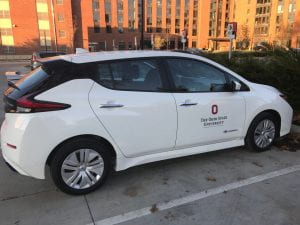How We Got Started
The most recent rendition of the Food Recovery Network (FRN) at Ohio State had humble beginnings in the bottom of a dining hall garbage can. It started when Michael Scherping, Mike Fackler, and Timothy Kirby, three OSU undergrads at the time, all realized that tremendous amounts of food were being unnecessarily wasted at campus dining facilities. Instead, they hoped to donate the otherwise wasted food to those in need. And, after a reaching out to the student government, were connected together. In less than 6 months, with lots of help from Kathie Serif and numerous other OSU dining staff, they were recovering hundreds of pounds of food per week.
Growth
In the first year, Fall 2017 to Spring 2018, recoveries started with GEM carts, campus-owned utility vehicles. The team drove the cart at 7 AM to five different dining locations to pick up leftover food from the previous night. Then, the donatable meals were transferred to a passenger vehicle for donation. However, eager to expand operations, FRN was soon visiting 8 locations and donating 420 pounds of food per week. This was a pivotal point for the team as they were now easily surpassing the capacity of their vehicles. So, they began looking for alternative means of transportation and funding.
Becoming Eco-Friendly (Our BagelMobile)
As the team continued to grow to more than 20 members by the Spring of 2019, the OSU Smart Campus Challenge emerged. Ohio State Energy Partners (OSEP) was hoping to donate to student projects via a Sharktank-esque student project competition. After proposing continued expansion of FRN activity and the development of a donation tracking application, FRN and Smart Campus, another OSU student organization, secured 1st prize, a trip to Paris and $54,000. With this funding, FRN purchased its own vehicle, a 2019 Nissan Leaf, and co-developed an application to track the donations of all OSU dining facilities. Together, these tools have enabled FRN to increase its donations by an estimated 40-50% in 2019 and begin the tracking of food waste at OSU. In doing so, FRN hopes to provide 187,000 meals to those in need in Columbus and divert 390,000 pounds of C02 from the atmosphere by 2024.